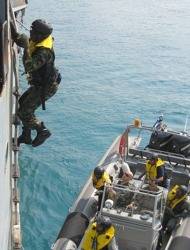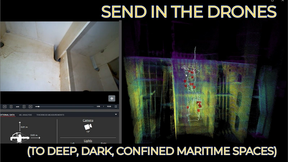IMO Signs-up with UN & EU on Counter-piracy
IMO signs strategic counter-piracy capacity building partnerships with UN agencies and EU
The commitment of the International Maritime Organization (IMO) to combat piracy off the coast of Somalia through boosting capacity building in the region has been underlined with the signing of five strategic partnerships with a number of UN agencies and the EU, following a Conference on Capacity Building to Counter Piracy off the Coast of Somalia, held at IMO Headquarters in London on 15 May 2012.
The Conference was attended by some 300 delegates from member States as well as a number of organizations. It saw presentations on capacity building as a mechanism to tackle the piracy issue, focusing on matters such as building maritime infrastructure and law enforcement capacity and the implementation of the Code of Conduct for the Repression of Piracy and Armed Robbery against Ships in the Gulf of Aden and the Western Indian Ocean (Djibouti Code of Conduct), which had been the subject of a Ministerial meeting held at IMO on 14 May, also at IMO.
The Ministerial meeting was attended by Ministers, Ambassadors and senior officials of the States participating in the Djibouti Code of Conduct, as well as representatives of the donor States to the Djibouti Code of Conduct Trust Fund. South Africa, which also attended the meeting, signed the Djibouti Code of Conduct during the Conference on Capacity Building (see Briefing 14/2012 ), becoming the 19th State to sign the Code.
The Ministerial meeting agreed that the Djibouti Code should not be open to other States, should continue to be a non-binding Code, however, the meeting agreed to review the status of the Code in the coming two years. The meeting noted that the implementation of the Code would also enhance capabilities and capacities to counter such threats.
The meeting noted that IMO had agreed to be part of the combined UN efforts on the ground in Somalia, based on the Somalia Roadmap and the Transitional Federal Government National Security and Stabilization Plan.
The meeting also noted an initiative to focus the implementation of the Djibouti Code of Conduct in terms of maritime awareness and operational capability in the southern high-risk area, including the Mozambique Channel. The details of the initiative, including liaison with African organizations such as the Southern African Development Community (SADC), were still to be worked out.














